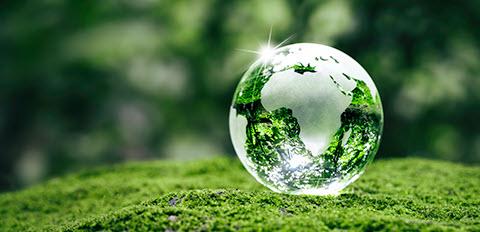
The library has an active part in supporting a healthy community. One way the library contributes to this effort is by minimizing its impact on the environment. At our libraries, you may notice library operations avoid single-use products or use of unhealthy chemicals, and encourage recycling and minimizing waste.
Here are some ways your experience at the library is sustainable:
- Several library locations have electric vehicle charging stations, on-site parking, and bike racks.
- Some locations are also energy efficient buildings, or have efficiency features like:
- Solar panels which convert sunlight into electricity
- Mechanical systems that optimize energy performance
- Windows which allow natural sunlight inside
- All library locations are powered by 100% green electricity through Renewable Energy Credits.
- Receipts are printed on Blue4est paper (the most toxin and chemical-free printing paper in the world).
Sustainability in library design
- Central Library became the first library in Oregon with an eco-roof in 2008.
- Capitol Hill Library has a learning garden.
- Hillsdale Library is a LEED Gold building, and a certified Backyard Habitat.
- Rockwood makerspace at the Rockwood Library has a bioswale outdoor design element to remove silt and pollution from surface runoff water.
Notably, the new building projects and construction have sustainable and impactful features. The majority of buildings under construction are on track for LEED Gold certification. This is one of the highest levels of energy efficiency awarded to buildings and a County standard.
The new library Operations Center is on track to be LEED Gold certified. It’s also the first facility to meet Multnomah County's 2021 Fossil Fuel-Free Buildings resolution.
Several building elements contribute to the Operations Center LEED certification:
- The building sits on an existing site (a former grocery store), which led to a ~66% reduction in calculated embodied carbon over having built out a new site.
- Over 600 solar panels on the building rooftop convert sunlight to electricity.
- Achieves net-zero energy by generating energy on site using clean, renewable resources.
- Capacity for up to 40 charging stations for electric cars and library fleet vehicles.
Recycling is also a central component of sustainability. Multnomah County Library’s building projects follow the City of Portland’s ordinance which lays out best practices on recycling. This includes ensuring that 75% of waste from building projects is recycled.
For the library building projects, some tables and chairs from libraries under construction were donated to local nonprofit organizations. Other tables and chairs will be refinished for reuse in other locations as needed.
Get involved
At library locations, you can find books on environmental issues, making your home more sustainable, reducing your carbon footprint and more. Explore some of these booklists:
- Dress and live greener from Multcolib My Librarian Kate
- Celebrate Earth Day
- Nature and ecology for grades K-3
- Nature and ecology for grades 4-8
- The path to sustainability: An Earth Day list about climate crisis and action
You can also check out electricity usage monitors, which can help project energy costs at home.